
Todd Price
Bible translation consultant for Pioneers/Roma Bible Union
Occupation
Bible Translation Consultant
Education
PhD, London School of Theology
Website
http://toddprice.wordpress.com
Libraries
![The Letter to the Ephesians [Withdrawn]](https://bestcommentaries.com/images/bookthumbs/4-thumb.webp)
![The Letter to the Ephesians [Withdrawn]](https://bestcommentaries.com/images/bookthumbs/4-thumb.webp)
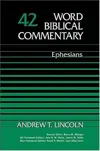

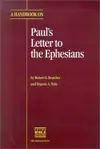

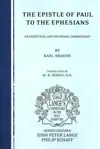



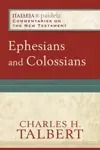

![The Letter to the Ephesians [Withdrawn]](https://bestcommentaries.com/images/bookthumbs/4-thumb.webp)
![The Letter to the Ephesians [Withdrawn]](https://bestcommentaries.com/images/bookthumbs/4-thumb.webp)
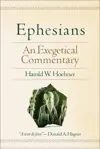



Reviews
Ephesians. BECNT. Baker Academic, 2010.
It is a fantastic commentary and I am really enjoying it.
His section "The Circumstances that Prompted Ephesians" is outstanding. He gives sound suggestions while admitting that we cannot know for sure.
Thielman's writing style is lucid and easy to follow. He manages to deal with technical problems while still writing clearly about it and not getting lost in the details. It reads more like a book than a commentary, which in this sense is a good thing.
He is wise in his handling of Greek lexemes, as is shown by his sane and cautious handling of ανακαταλλασσω (p. 171, n. 28).
As 4:1-6 is such a crucial passage in Ephesians, and a key one in my own research, I was delighted to see how well Thielman handled the text, bringing out its importance as a bridge between chs. 1-3 and 4-6 and showing how unity works on in the life of the church.
Thielman deals judiciously with Greek semantics, grammar and syntax. Most of the time, he avoids overloading terms with extra meaning and keeps a clear head while dealing with various syntactical options (cf. 4:12-13).
I give this commentary 4.5 out of 5 stars!
[Full Review]
Colossians and Ephesians. SP. Liturgical Press, 2008.
My comments below are mainly about the half of the commentary on Ephesians.
This is not, IMO, a truly exegetical commentary. For detailed exegesis, we still need to turn to Best, Lincoln and O'Brien. Although MacDonald does give her own translation and does have verse-by-verse notes, her emphasis is more on the overall theology of Ephesians.
Just as I found it troubling that Pheme Perkins continually seeks to drive a wedge between Ephesians and the "genuine letters of Paul," I find the same false dichotomy in MacDonald. One example goes as follows: "It is being argued in this commentary that one of the major purposes of the work is to encourage greater isolation from the outside world and this represents a significant departure from the attitude to the world that is normally encouraged in the undisputed letters of Paul and in Colossians" (212). MacDonald footnotes Perkins often, though MacDonald appears to be more cautious in pointing out differences between Ephesians and "the genuine letters". Reading the commentary, I got the feeling that MacDonald too often relied on Perkins rather than doing her own original discovery.
I remain unconvinced that baptism is "a central feature of both Colossians and Ephesians" (288). Aside from its specific mention in 4:6, it seems to me that it is not mentioned nor alluded to at all. MacDonald seems to see baptism all over the place in Ephesians, even perhaps in 2:1-6 and 4:8-10, which is anything but self-evident. Perhaps MacDonald's Catholic perspective, and my Anabaptist perspective, skew our understanding in opposite directions. But it still appears to me that exegetically, it has not been proven that baptism is a major issue in Ephesians, nor that it was a baptism homily or contains baptism liturgy.
On a more positive note, her explanation of Ephesians strategies for encouraging unity on 297 (commenting on 4:1-6) are outstanding. She is right on there. Also, her bibliographies at the end of each section are very helpful in chasing down the appropriate secondary literature on subjects germane to that section.
IMHO, this commentary deserves a quick reading alongside the more standard--dare I say, more trustworthy--works of Lincoln, Best and O'Brien, but no more than that.
[Full Review]
Ephesians. ANTC. Abingdon Press, 1997.
In my opinion, Perkins is so bent on differentiating Ephesians from the true Pauline writings, that she distorts the picture by claiming that Ephesians differs markedly not only from Paul's style, but also on major themes like salvation. Under the section "Where Ephesians Differs: Theology, Language and Style" (pp. 20-27), she lists numerous alleged differences and discrepancies.
Convinced that Ephesians is pseudepigraphal, she points out what she sees as differences between Ephesians and the genuine Pauline letters. But Perkins has surely overstated her case: " There is no more distinction between Jew and Gentile. The whole complex of linguistic formulae that the apostle created to describe the inclusion of Gentiles in the promise of salvation has vanished with hardly a trace (Schnackenburg 1991, 26-27; Lincoln and Wedderburn 1993). This shift may be grounded in rhetoric as well as theology. Mark Schoeni’s study of the “how much the more” formulae in Romans 5 discovered an important semantic distinction between using the topic “justification” and using “reconciliation.” The language of justification is structured in such a way that it discriminates and divides. It acknowledges the singular differences between Jew and Gentile. Reconciliation 'sublates and unites.' By incorporating the differentiated singularities into a greater whole, reconciliation denies their significance (Schoeni 1993, 181). Though Paul works with both reconciliation and justification, Ephesians has taken the reconciliation imagery of Rom 5:1-11 to be the Pauline understanding of salvation. Consequently, distinctions in Paul’s terminology will be overridden by unity" (21–22). Though Perkins states that Schoeni “discovered an important semantic distinction”, it appears that he did no such thing. He did not “discover” it on semantic grounds but rather assumed it for his argument on rhetorical grounds. [Marc Schoeni, “The Hyperbolic sublime as a master trope in Romans,” in Rhetoric and the New Testament: Essays from the 1992 Heidelberg Conference, vol. 90, eds Stanley E. Porter and Thomas H. Olbricht, JSNTSS (Sheffield: JSOT, 1993), 90:180–81.] His essay does not give semantic evidence for this argument.
These are actually very odd statements. First of all, what does she mean by “the language of justification”? I’m pretty sure she is not speaking about language, per se, in the sense of semantics. It appears that she means the concept of justification. She juxtaposes justification with (against) reconciliation, saying that the concept of justification “discriminates and divides,” that it acknowledges the differences between Jews and Gentiles, while reconciling them unites them and thus “denies their significance” (21–22). She seems driven to drive a wedge between Ephesians and authentic Paul and assumes that justification and reconciliation cannot be taught by the same person. This is extremely odd. For centuries orthodox doctrine has included both and found both in Paul.
Perkins is surely wrong in her claim that though the genuine Pauline letters recognize a difference between Jews and Gentiles, in Ephesians these distinctions "will be overriden by unity" (22). Why can’t both be true? Who is to say that Paul did not recognize that Jews and Gentiles are one in Christ, but yet there remain ethnic and cultural differences.
She states, "Ephesians never speaks of Christ coming in judgment. Its ecclesiology short-circuits such language, since the church already exists in the unity of the saints with their exalted head" (27). This is another example where Perkins drives a wedge between the genuine Paul and Ephesians, claiming that they are incompatible. Again, "Colossians limits the believers’ identification with the exalted Christ to the future coming of Christ. For Ephesians, the saints are already one with their Lord" (29).
I would also have to strongly disagree with Perkins on the make up of the church in Ephesus (and/or Asia Minor as a whole): "Some interpreters lift the problematic of Gentile conversion from Pauline Epistles to explain the need for their ethical instruction in Ephesians. But though the center of the apostle’s gospel did require that both Jew and Gentile be made righteous on the same basis, through faith (Gal 2:15-21), Ephesians never deals with those concrete details of the Law that distinguish Jew and Gentile. Ephesians can refer to 'circumcision' and 'uncircumcision' as markers of the two communities (2:11) without any indication that the distinction created a problem for relationships between Jewish and Gentile Christians in their unity. Contrast Colossians where circumcision is spiritualized (2:11), and Jewish Sabbaths, holy days, and food laws are rejected (2:16-17). Ephesians 2:15 refers without difficulty to the 'law with its commandments and ordinances' abolished by the cross. Consequently, many scholars agree that the churches to which Ephesians is written cannot include an active, Jewish Christian group" (29). In my view, this is extremely reductionistic and is an example of the fallacy of the excluded middle.
[Full Review]
Ephesians and Colossians. PAI. Baker Academic, 2007.
I enjoy Talbert's emphasis on first century Graeco-Roman backgrounds as shedding light on Ephesians, though I am not sure he has fully thought through whether these are simply interesting parallels or whether they actually affect our interpretation of Ephesians. For example, he states on p. 17: "Given the pervasive theme of unity in Ephesians, the 'world' of Ephesians must have included a desire for or emphasis upon unity and the overcoming of factions."
I’m not so sure about this. 1) One could say that everyone has a desire for unity, and that it is not necessarily unique or special to the Graeco-Roman world of the first century; 2) Talbert may be begging the question. He is saying, "Look how much they talk about unity. Unity must have been a really big deal for them which is why the author wrote about unity." That is a non sequitur. Just because Paul wrote about it and examples are found in contemporary literature does not necessarily mean that that is why Paul emphasized it. We could say Paul emphasized it because it is important in God’s eyes. It also so happens that the GR world at large also saw its value. These are interesting parallels but they do not prove that that is the reason the author emphasized unity. His comment simply does not follow.
A much better use of parallels, I believe, is on pp. 79-81 where Talbert does, in my view, establish that the hostility which was destroyed was caused by the Law. The Mosaic Law led to hostility because of the way the Jews separated themselves from non-Jews.
I think his excursus on election (pp. 49-52) is very well done; however, I have to admit that I probably say this more because of the fact that I agree with his conclusions, than that he thoroughly presents arguments from both sides. Space and the format of this commentary series preclude that type of detail.
It would have been helpful, though, if he had fleshed out his thoughts in places even more. He makes sweeping statements that "Jesus' death destroyed the law of commandments in decrees, that is the Mosaic law covenant (cf. Rom 10:4; Gal 5:23-26), not just the casuistic interpretation of the law or the ceremonial, as opposed to the moral law." Whether we agree with that conclusion or not, it seems that he should have acknowledged that this is a complex issue.
Again, Talbert gives fascinating parallels on pp. 82-83, but they don’t necessarily prove that the reader would make a comparison with Caesar Augustus.
I very much appreciate the well-placed and well-chosen illustrations, including the temple warning on p. 79 and the altar to Peace on p. 83.
By design, this commentary series does not deal with detailed exegesis or critical questions (like WBC, NIGTC, etc.) so I will not run to it for these features. But I find that the attention to the overall argument and theological contribution of Ephesians is very well done. I found his treatment of "Christ's Body" (pp. 86-88) to be very well argued.
I must disagree though with his conclusion on pp. 88-94 that Judaism and Christianity were one and the same religion until the second century. I see no disparity between Romans 9-11 and Ephesians 2, contra Talbert.
I found two things irksome as I read: 1) his assumption that Paul did not write Ephesians and thus his continual comparison to the "authentic" Pauline letters; 2) his repeated statements that "ancient Mediterranean auditors would have heard this statement as..." It would have been wiser, I believe, on this second point, to say that they may have or could have heard it as such and such. In order to be more firm in these claims, he would need to give more evidence and would also need to answer the counter evidence, which he does not do. Evenhandedness requires that the other alternatives also be mentioned, though the format of the commentary may preclude full argumentation for or against all positions.
[Full Review]
